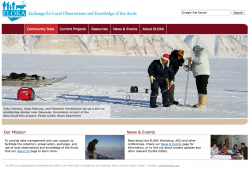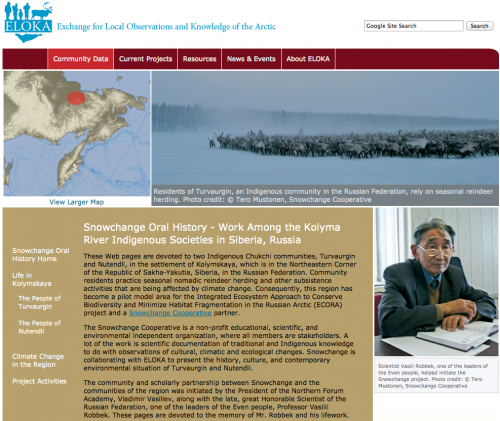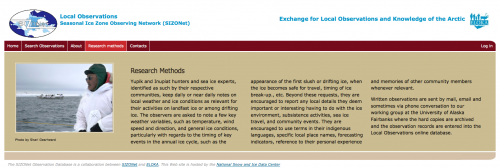By: Heidi McCann, National Snow and Ice Data Center

"I believe it is time for the harpoon and the computer to work together."
--Peter Katuk, Sanikiluaq, Nunavut
The Arctic has been home to Indigenous peoples for many generations. Out of the frozen landscape in which they dwell, Indigenous peoples have carved a productive, vital culture. From the learned experience and skills it is their local observations and knowledge that tell the story of drastic changes to the arctic climate—changes that have a global impact. Until recently, Indigenous local observations, knowledge, and involvement have been largely overlooked by science. Today, Indigenous peoples are acknowledged as investigators, partners, and collaborators. Their local knowledge and observations are being documented, collected, and preserved for use in arctic research, but this is not without its challenges, such as the preservation and transfer of knowledge.

Historically, oral transmission has been the dominant method for passing on knowledge in Indigenous culture. However, shifts in culture and adoption of innovative technologies over time have introduced new forms of preserving and learning. While useful, these modern forms of knowledge exchange and preservation cannot replace the intimacy that comes with practicing the use and understanding of acquired observations and knowledge of the environment. Collecting, preserving, and managing this knowledge outside of oral tradition needs to be a collaborative effort, while still respecting knowledge ownership. Developing data management tools and services through shared efforts that are effective, appropriate, and considerate to cultural sensitivity of collected information is critically important. At least one such project has emerged: the Exchange for Local Observations and Knowledge of the Arctic (ELOKA).
ELOKA, an NSF Arctic Observing Network (AON) project, is a data management research support service that specializes in working with arctic communities and researchers in the collection, preservation, and use of local and traditional knowledge (LTK) and community-based monitoring (CBM) data and information.
Launched during the International Polar Year (IPY) 2007-2008 and coordinated through the National Snow and Ice Data Center (NSIDC) at the University of Colorado, Boulder, ELOKA currently works with knowledge holders to make available LTK and CBM datasets ranging from qualitative data such as map overlays, transcripts, and audio/videotape interviews of subsistence hunters who hold valuable knowledge on sea ice, to quantitative data such as snow and ice thickness, temperature, and wind velocity. Data and information comes from such places as the northeastern Russian Federation where the Indigenous Chukchi reside to the Inuit communities in northern Canada and Greenland. Now in its third phase, ELOKA continues to provide data management services and support to arctic communities and others working with LTK or who are collecting data from CBM projects. ELOKA operates on the principle that all knowledge should be treated ethically, and intellectual property rights should be respected.
Current Community Datasets
ELOKA data and information resources represent international and interdisciplinary collaboration between the physical and social sciences and between researchers and communities. ELOKA also addresses cultural sensitivity issues that are not usually seen in standard physical science data management norms but are critically important when administering documented forms of LTK and CBM.
Current resources are overseen using a variety of methods and tools, as each project has different needs in presenting their data. Some will be simple with online data presentation, while others will require more advanced methods. An example of a dataset that requires simple technology in the form of a website is the Snowchange Oral History—Work Among the Kolyma River Indigenous Societies in Siberia, Russia product.

These data present the oral history of two Indigenous Chukchi communities—Turvaurgin and Nutendii—located in the settlement of Kolymskaya, which is in the Northeastern Corner of the Republic of Sakha-Yakutia, Siberia, in the Russian Federation. Documentation includes community lifestyle, maps, poems, and geographic and environmental information. The communities practice seasonal nomadic reindeer herding and other subsistence activities.
The Seasonal Ice Zone Observing Network (SIZONet) online application uses more advanced technological methods.

In support of researchers at the University of Alaska Fairbanks and in a number of Alaskan coastal communities, the SIZONet application makes available a collection of local observations and traditional knowledge of sea ice, its use and change, and how this change is affecting community and cultural activities. Collected through the dedication of Iupiaq and Yup'ik sea ice experts, it was developed to serve as an interface between two distinct knowledge systems of western science and local and traditional knowledge, while at the same time preserving and passing on LTK through a user-friendly interface. The system serves as an archive and instructional tool for the collaborating hunters and their communities. The application is designed to be flexible enough to change in response to the evolving nature of the observations while providing a framework that allows researchers to track and compare specific climatic, environmental, and ecological features and events across geographic locations and over time.
These and other datasets and applications are available at the ELOKA website and can also be accessed through the NSIDC data catalog.
Impact of Indigenous Knowledge on Science
LTK has been a part of arctic research for some time. Early northern explorers sought the local knowledge of the Indigenous peoples and understood that their knowledge and advice could be the difference between life and death.
Today, LTK and CBM are receiving more respect and inclusiveness within modern science and policy. Use of Indigenous knowledge with western scientific measurement shows researchers that 'another way of knowing' offers improved understanding about what is happening in the Arctic. For example, using LTK and CBM, test climate models can be refined for better accuracy as well as provide new categories of information that need to be considered.
Indigenous peoples will continue to contribute local and traditional knowledge and data from community-based monitoring projects to improve our understanding of recent environmental, social, and cultural change. However, to foster the momentum and building of arctic resident participation and partnership in scientific research, while respecting knowledge ownership, ELOKA will maintain its current data management practices in an ethical manner in order to share observations and knowledge of the Arctic with future generations.
References
Pulsifer, P., S. Gearheard, H. P. Huntington, M. A. Parsons, C. McNeave, H. S. McCann, 2012. The role of data management in engaging communities in Arctic research: Overview of the Exchange for Local Observations and Knowledge of the Arctic (ELOKA). PolarGeography, 35 (3-4). 271-290. DOI: 10.1080/1088937X.2012.708364
Heim, M. 2010. "Inuit knowledge helps scientists learn something new about Arctic weather". The Nature Files (blog). April 7, 2010. http://naturefiles.wordpress.com/tag/shari-gearheard/
Weatherhead, E., S. Gearheard, R.G. Barry. 2010. Change in weather persistence: Insight from Inuit knowledge. Global Environmental Change. 20, 523-528. DOI: 10.1016/j.gloenvcha.2010.02.002
Huntington, Henry P. 2000. Using Traditional Ecological Knowledge in science methods and applications. Ecological Applications 10 (5). 1270-1274. DOI: 10.1890/1051-0761(2000)010[1270%3AUTEKIS]2.0.CO%3B2.
ELOKA Team. "Snowchange Oral History - Work Among the Kolyma River Indigenous Societies in Siberia, Russia". Exchange for Local Observations and Knowledge of the Arctic.
Pulsifer, P., S. Gearheard, H. P. Huntington, C. McNeave, M. Parsons. Exchanging and Sharing Knowledge: Tools, Services and Network Development in Support of Local and Traditional Knowledge Stewardship. Akureyri: Iceland, 2010. http://www.iassa.org/images/stories/newsletters/northern_notes_32_sprin….
For further information, see the ELOKA project website or contact Heidi McCann (heidi.mccann [at] nsidc.org).
